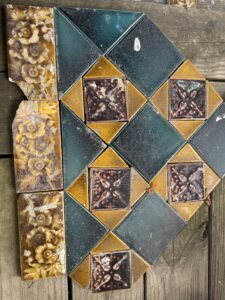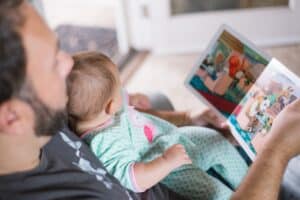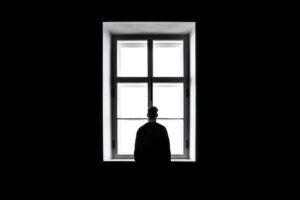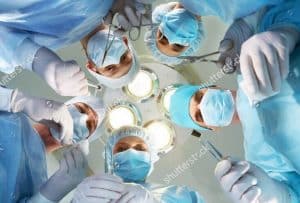I remember a long, hard day at work, longer than summer sunlight. In the course of about 17 hours, I had laughed and cried, snapped at people and extended empathy. It was now late, mere hours before I should be getting out of bed again.
Besides a patient bleeding, there was a patient with a leaking valve whose surgery was much longer than expected, a young patient with an unexpected mass pressing against an important vein, patients with cancer needing to be taken out, and patients trying to recover from heart surgery and deal with dementia at the same time.
Everyone in the OR was tired. There were short words and punch drunk laughter. People gulped sticks of string cheese and protein drinks to offset hours of no calories. There were plastic trash bags full of blue drapes and gauze that had once been white. There were red shoe prints on the floor.
After the patients went to critical care, I walked to the surgeons’ office. I could hear Dr. Dickson and Dr. Halloran discussing their surgeries behind the closed door, although I couldn’t exactly hear what they were saying.
For a second I stood outside. At one time I would have stayed outside, too afraid to interrupt. But after a second I knocked, and walked in. They glanced up in acknowledgment and continued talking.
Dr. Dickson was sitting in the arm chair by the door, and Dr. Halloran was sitting behind his desk in his office chair. There was a chair across the desk from him, but after standing for a moment, I sat down on the carpet in front of the door.
“You can sit in a chair,” Dr. Dickson said.
“I don’t want to sit between you,” I said with a tired shrug, my head leaning back against the door.
“That would be a little dangerous,” he said. “You would always have your back to one of us.”
They kept talking. Terms that I barely recognized, flew back and forth as they discussed the long day in surgery. Dr. Dickson was talking about a technically challenging repair of a heart valve.
“There was a student surgeon once,” Dr. Halloran said. “At the end of an operation like this one he went to lift the heart. The surgeon training him said, ‘Don’t do that!’ And just that quick the heart…”
Dr. Halloran flung his hands in the air to finish the sentence.
“And it was all over,” Dr. Dickson said.
“And it was all over,” Dr. Halloran agreed.
They kept talking but I kept seeing the heart break in half and hearing the senior surgeon saying, Don’t do that, just a second too late.
Even in my tired state on the carpet, I gained fresh admiration for the surgeons for surviving the stresses and strains of heart surgery. Any one with blood on the soles of their tennis shoes (in the effort of saving life, not taking it) lives in a realm where “I had a bad day” is on another scale. It’s a different world than forgetting to place an order for groceries or forgetting to put your wet laundry in the dryer.
And I also had a sense of the privilege to sit and listen to these men who have been through so much in this field, and to know that I had been a part of their efforts, all through the long day while they were bent over their patients.
As it so often does, this led me to think about the great Surgeon of hearts. How about the fact that he sent His actual Son to the earth so that humanity could physically knock on the door of his room, sit on the carpet at his feet, and learn?
“According to the gift of God’s grace…according to the eternal purpose that he has realized in Christ Jesus our Lord, in whom we have boldness and access with confidence through our faith in him” (Ephesians 3:7,11,12).
Or, “Let us then with confidence draw near to the throne of grace, that we may receive mercy and find grace to help in time of need” (Heb 4:12).
Boldness and confidence to access God. This is what Jesus gives us! And more than footprints of blood, He gave his own blood, drop by drop.
What a wonderful privilege, to work with God, to be able to enter His presence! Many times in the past I have been afraid. But as I hear stories of his work with the hearts of men, I am ever learning to knock on the door and enter with confidence.
And in every spiritual battle, God’s instruments are reliable. “The weapons of our warfare are not of the flesh, but have divine power to destroy strongholds” (2 Corinthians 10:4).
Just as I saw the shoe prints in blood and watched the surgeons labor over their patients through that long day, so I can see the shoe prints of God’s work in my own life.
“We’ve got to believe God, Katrina,” my neighbor Mary says.
Lord, I believe; help my unbelief! I cry sometimes.
But then I see His shoe prints in my own life and the lives of the people around me, and I know He is working in our hearts, beyond what we could ask or think.





4 thoughts on “Shoe Prints”
Beautifully expressed!
Thanks Dawn!
Thanks for writing and sharing this Katrina! I love how you put it… Jesus giving His blood drop by drop. I’m unworthy of His continuous grace and redemption in my life, but so thankful! God bless you as you continue serving in this field!
Glad you were blessed. We are all unworthy!